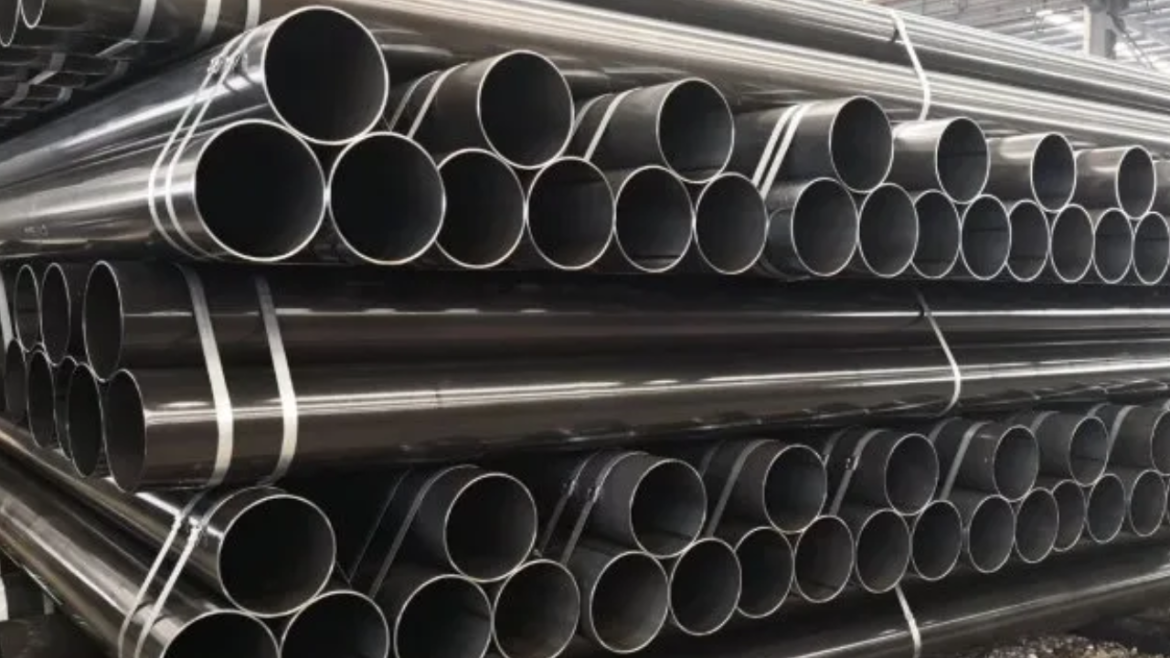ERW (Electric Resistance Welded) steel pipes are a common form of pipe used in a wide range of industrial applications. ERW pipes are manufactured using a continuous steel strip unwound from coils. The strip is then run through a succession of rollers, where the edges are heated and fused to form a longitudinal seam. This electric resistance welding procedure reinforces the pipes’ structural integrity.
ERW steel pipes are popular due to their low cost. The manufacturing methodology is quite simple, resulting in a more cost-effective production process when compared to other pipe manufacturing methods. This makes erw steel pipe an appealing solution for applications where cost is a critical factor. Because of their simple production process, ERW pipes are also easy to install.
Benefits of ERW Steel Pipes
Electric resistance welded (ERW) steel pipes have developed as critical components in a variety of sectors, offering a low-cost and efficient solution for a wide range of applications. In this detailed article, we will look at the many advantages of ERW steel pipes, including their manufacturing method, structural properties, versatility, uses across industries, and environmental issues.
Cost-Effectiveness and Affordability
ERW steel pipes are well-known for their cost-effectiveness, making them an affordable option for a variety of applications. ERW pipes are manufactured using electric resistance welding, which is a reasonably simple and efficient approach when compared to other pipe manufacturing processes. The cost savings realized during production help to make ERW pipes an affordable alternative, especially in projects where economic considerations are important.
Efficiency in Manufacturing
ERW steel pipes are manufactured using a continuous steel strip that has been unwound from coils. The strip is then fed through a succession of rollers before the edges are heated and fused to form a longitudinal seam. This process’s efficiency allows for a high production rate, making ERW pipes a commonly available and swiftly produced alternative for a wide range of applications.
Versatility in Applications
ERW steel pipes are versatile, finding use in a variety of industries and situations. They are widely used in oil and gas pipelines, water supply systems, structural components in buildings, and a variety of industrial activities. The versatility of ERW pipes highlights their relevance in meeting the needs of various industries, contributing to their broad use.
Structural Integrity and Strength
ERW steel pipes are widely recognized for their structural integrity and strength. The longitudinal seam generated during the welding process creates a continuous and sturdy structure. Advances in welding techniques have improved the quality of the welded seam, guaranteeing that ERW pipes perform reliably, even in applications requiring structural strength.
Wide Range Of Sizes and Thicknesses
ERW steel pipes are available in a variety of sizes and thicknesses to meet varied project specifications. ERW pipes are available in a variety of sizes and thicknesses, from small-diameter pipes for plumbing to large-diameter pipes for industrial pipelines. They are excellent for a wide range of building and infrastructure projects due to their adaptable nature.
Speedy and Efficient Installation
The manufacturing process is simple, which contributes to the convenience and speed with which ERW steel pipes may be installed. Their availability in a variety of sizes, along with a simple welding procedure, allows for quick and effective installation in construction and infrastructure projects. This efficiency is especially useful in projects with tight deadlines or where minimizing downtime is critical.
Resistance to Corrosion
ERW steel pipes are highly resistant to corrosion, ensuring long-term performance in a variety of applications. These pipes are protected from corrosive elements through extra processes such as galvanization or coating. This corrosion resistance makes ERW steel pipes ideal for areas where moisture, chemicals, or hostile substances are present, contributing to their longevity and dependability.
Environmental Considerations
While the fabrication of ERW steel pipes requires energy-intensive processes, its efficiency in material utilization and capacity to recycle steel contribute to environmental sustainability. The endurance of ERW pipes decreases the need for frequent replacements, which aligns with sustainability objectives. Furthermore, advances in coating technologies help reduce the environmental impact of ERW pipes by increasing their resilience to corrosion.
Remarks
The advantages of ERW steel pipes are multifarious. As a low-cost and widely available solution, ERW pipes have become essential components in infrastructure building. Continuous developments in welding technology and coating processes improve the performance and reliability of ERW steel pipes. As industries grow, the adaptability and advantages of ERW pipes position them as critical components in addressing today’s engineering difficulties.

